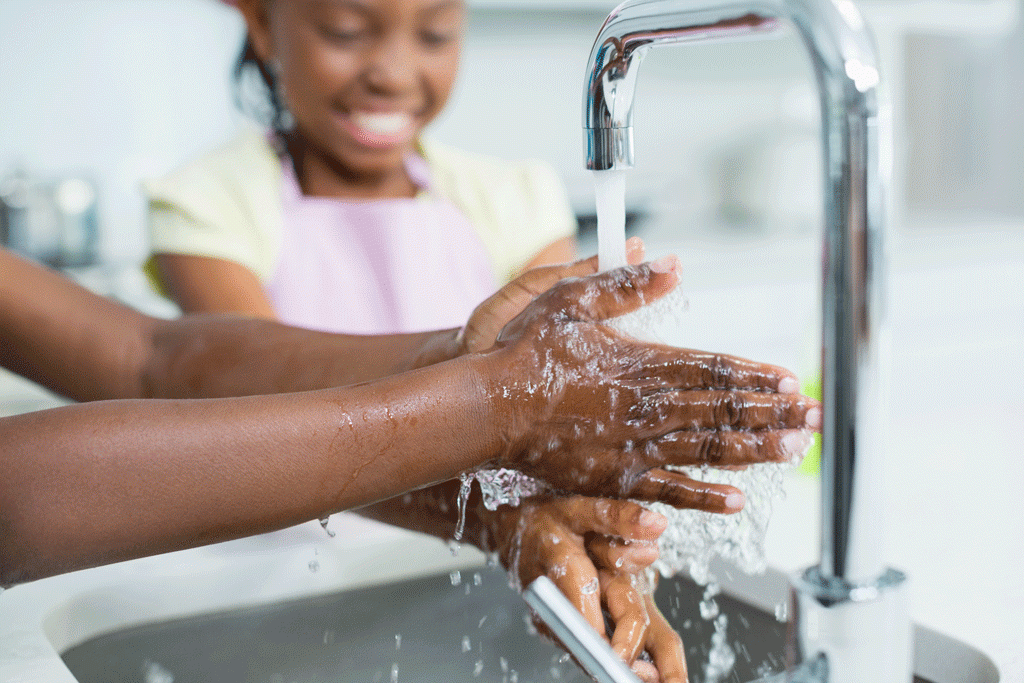Teaching your children how to cook is a great way to bond while passing down a healthy skill they can use for the rest of their lives. Of course, the kitchen isn’t the safest area for children. From sharp knives to hot surfaces, there are plenty of ways little hands can get hurt. That’s why it is so important to also teach your kids kitchen safety along with your favorite recipes.
Use the following guidelines to help keep your kids free from harm while working in the kitchen.

Proper Food Handling
The bacteria living in raw food can be just as harmful as knives and fire. Before you let your child handle sharp objects or even place a tray of cookies in the oven, you want to teach them about handling food and preventing contamination. A good place to start is hand washing.
When washing their hands, teach your kids to use warm– not scalding hot– water and plenty of soap. They need to rub their hands together thoroughly and be sure to get under their nails before rinsing off. The whole process of washing their hands should take about 20 seconds— the length of time it takes to sing the “Happy Birthday” song. To make it more fun, you can teach them your own hand washing song they can use when it’s time to clean up.
Beyond proper hand washing technique, you should also teach your kids when they need to do it. Any time they touch their face, the garbage, a pet, raw meat, or any other questionable surface, it’s a good idea to wash and sanitize. Beyond their hands, also teach them that utensils, counter surfaces, and cutting boards should be cleaned often and thoroughly as well– especially if they’ve come in contact with raw meat. Finally, any time you bring home fresh fruits and vegetables, show your kids how to properly rinse them and talk to them about where their food comes from and why there is dirt on it in the first place.
Fire Safety
Every year, thousands of people are injured by fires started in the home. When teaching your child how to cook, always supervise them whenever they are near a hot surface or handling any hot food items. Instruct your children to never try to handle a fire on their own; instead, they should always come get you or another adult if there is a danger present. Your kitchen should be equipped with a fire extinguisher you can easily access in order to put out grease or oven fires.
Other things to note to your kids:
- Never throw water on a grease fire.
- Always use oven mitts when handling pans or pots from the stove or oven.
- Avoid wearing dangling or loose clothing that can catch fire.
- Smoke detectors should always have fresh batteries.
- Never leave a fire unattended.
Knives and Other Sharp Objects
Determining whether or not your child is ready to learn how to use knives and other sharp objects in the kitchen depends on both you and your child’s comfort level. However, many experts concur that kids as young as three can begin learning about how to use a knife with plastic cutlery or knives designed especially for little hands. Figuring out how to hold and use a knife early on can help prevent injury as they grow and begin using larger and sharper objects.
***
Bonding with your kids in the kitchen is a great way to teach them about food and cooking healthy meals. You can protect them from the dangers cooking presents by establishing rules regarding things such as sanitation, fires, and using sharp objects like knives. When kids learn how to cook safely early on, it can seriously help reduce their chances of getting injured as your junior chefs grow and develop their skills.
Post by Daniel Sherwin at Dadsolo.com
